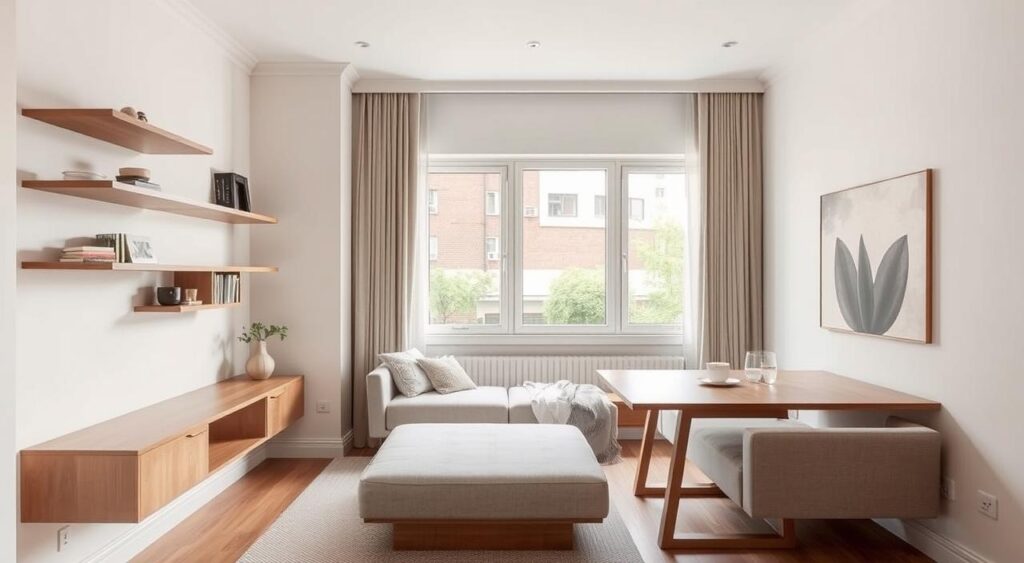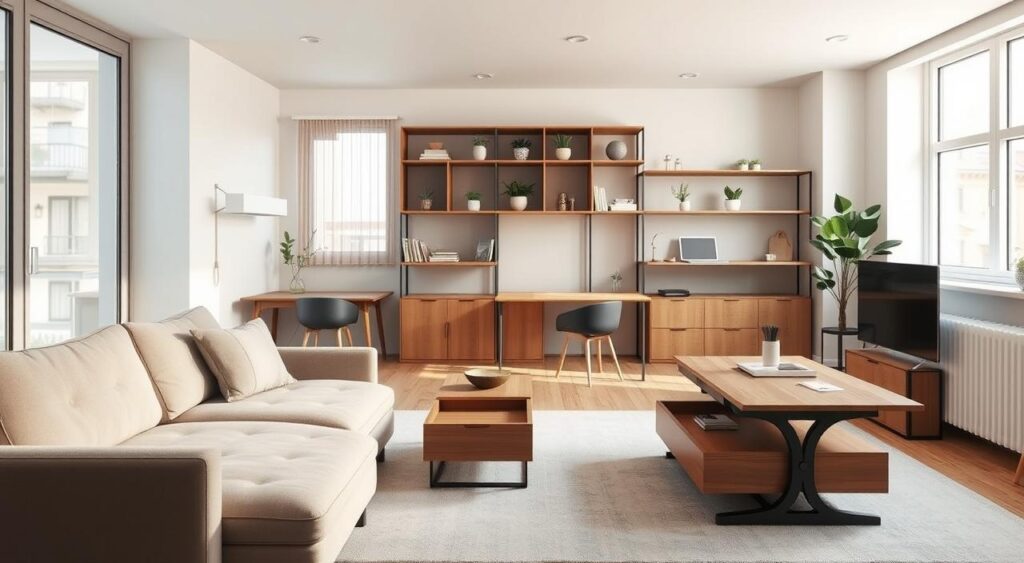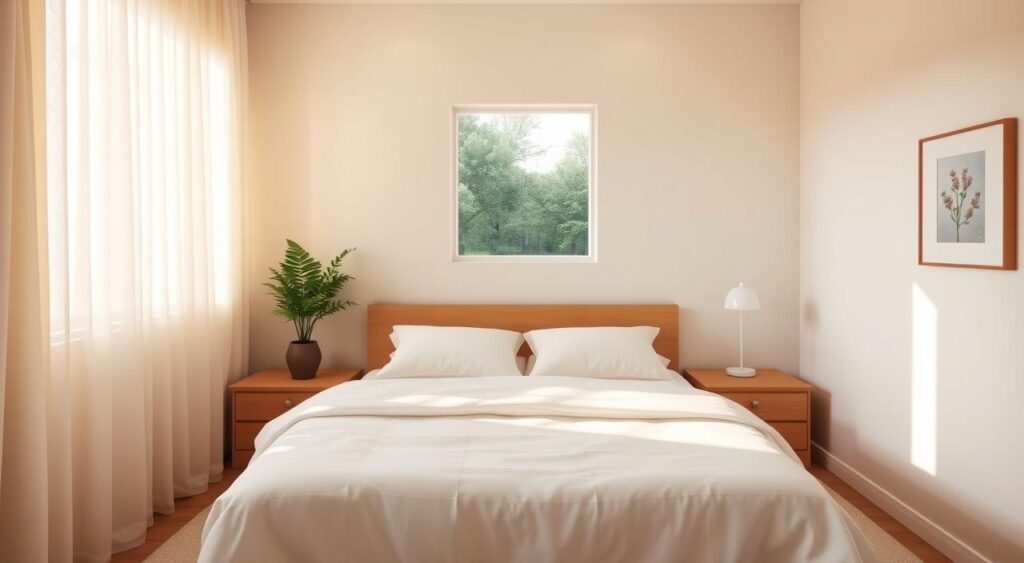London flat space-saving is more than a clever design trend—it’s becoming essential for city living. With property values climbing and average flat sizes shrinking, Londoners are rethinking how to live well in compact homes. Smaller spaces, when organised effectively, can deliver surprising financial, environmental, and lifestyle benefits.

From multi-purpose furniture to minimalist choices, the right systems ensure that limited square metres feel generous, stylish, and functional. Downsizing no longer signals loss—it opens opportunities to simplify, save, and thrive in the capital’s busy housing market.
Key Takeaways
- Downsizing often releases over £64,500 in equity while reducing bills.
- Compact homes cut carbon footprints by up to 70%.
- Integrated storage systems outperform temporary fixes.
- Vertical layouts increase usable floor area by up to 40%.
- Multi-functional furniture keeps homes adaptable and efficient.
Why London Flat Space-Saving Matters
Financial Benefits of London Flat Space-Saving
Property decisions in London carry significant financial weight. Moving from a £500,000 house to a £300,000 flat, for example, frees £200,000 in equity—funds that can:
- Clear existing mortgages
- Support retirement savings
- Help children with property deposits
Utility bills also shrink. A smaller flat requires less energy to heat, cool, and maintain.
| Property Size | Average Energy Bill | Annual Saving |
|---|---|---|
| 1–2 bedrooms | £115.14/month | £1,363.20 |
| 5+ bedrooms | £228.74/month | – |
Lifestyle Simplification Through Space-Saving
A compact flat means less cleaning, fewer repairs, and fewer possessions to maintain. Research shows that 68% of residents in smaller, well-organised homes report lower stress levels. With less time spent on upkeep, residents reclaim hours for leisure, career, or family.
The Principles of London Flat Space-Saving
Strategic Decluttering
Clutter is the enemy of small homes. Begin with the four-box system: keep, donate, sell, discard. Apply the 12-month rule—if an item hasn’t been used for a year, it’s unlikely to be essential.
Londoners benefit from multiple disposal avenues:
- Charity shops welcome quality donations.
- Council recycling centres handle bulky waste responsibly.
- Marketplaces like Gumtree provide quick resale options.
Decluttering also clears mental space, reducing decision fatigue and increasing daily productivity.
Minimalism with a London Twist
Minimalism isn’t about deprivation—it’s about intentional selection. By choosing fewer, higher-quality items, Londoners create homes that feel more spacious and less stressful.
| Aspect | Traditional Living | Minimalist Living |
|---|---|---|
| Decision Fatigue | Daily | Monthly |
| Storage Use | 82% | 34% |
| Maintenance Hours | 6.5 weekly | 2.1 weekly |
Minimalism also promotes sustainability, aligning with London’s growing eco-conscious culture.
London Flat Space-Saving Systems That Work

Multi-Functional Furniture in London Flats
Every piece of furniture in a compact home should serve more than one purpose.
| Furniture Type | Space Saved | Key Benefit |
|---|---|---|
| Sofa Bed | 5–7m² | Doubles as guest sleeping space |
| Extendable Table | 3m² | Meals + remote work |
| Vertical Shelf | 1.2m² | Holds 150+ items |
Before buying, always measure staircases and doorways. Many Victorian conversions have entrances under 75cm wide, making modular, assemble-on-site furniture a smart choice.
Storage Beds and Compact Sofas
Ottoman beds provide discreet compartments for linens and clothing. Sofa beds with built-in storage replace both a guest bed and a storage chest, saving nearly 2m² of floor area.
Key features to consider:
- Modular sections that adapt to room layouts
- Integrated charging ports for devices
- Durable, stain-resistant fabrics for urban living
Dining Tables That Transform
With hybrid work on the rise, dining tables double as workstations. Wall-mounted fold-down tables or extendable models with cable management keep spaces flexible.
Retailers such as Oka Direct and Spaceology offer durable pieces that withstand daily shifts between meals and meetings.
Creative Storage Systems
Compact London flats thrive on clever organisation. Well-designed systems transform overlooked areas into functional space.
- Floating shelves above doorways store seasonal items.
- Mirrored cabinets double storage and enhance light.
- Under-stair drawers hide shoes or cleaning tools.
- Ottoman coffee tables conceal remote controls and magazines.
| Feature | Solution | Space Saved |
|---|---|---|
| Bay Windows | Built-in bench seating | 1.8m² |
| Fireplace Alcoves | Retractable shelving | 0.9m² |
| High Ceilings | Over-door racks | Vertical |
Organised spaces also boost mental wellbeing. Neuroscientists report that tidy homes reduce cognitive load by 27%, helping residents feel calmer and more focused.
Designing with Vertical Space
The Power of Height
In London flats, floor area is limited but ceilings are often generous. Vertical strategies increase usable space by up to 40%. Ladder-style shelves, tall wardrobes, and wall-mounted racks expand storage capacity without crowding the floor.
Hidden Compartments
Furniture with concealed compartments helps maintain a minimalist look while storing essentials. Examples include:
- Ottoman beds with hydraulic lifts
- Hollow footstools for magazines
- Benches with integrated storage under seating
These designs ensure that even small living areas remain clutter-free and stylish.
Planning a Move into a Smaller Flat
Measuring for Accuracy
One of the biggest challenges in London flat moves is fitting furniture through narrow staircases and corridors. Always:
- Measure items diagonally to ensure fit.
- Use graph paper or apps like MagicPlan to plan layouts.
- Create a colour-coded spreadsheet of measurements for moving day.
Avoiding Moving Day Problems
Surveys reveal that 42% of London movers abandon items that won’t fit into new flats. To prevent this, consult professional clearance services. House Clearance London UK offers tailored solutions to manage unwanted items, saving time and money.
The Psychological Impact of Compact Living

Living in smaller, well-organised flats can positively affect mental health. Studies from Cambridge University highlight that 73% of residents in efficient homes report improved emotional wellbeing.
The reasons are clear:
- Less clutter = reduced visual stress
- Simplified routines = better sleep quality
- Intentional design = more satisfaction with home life
Minimalist spaces also free time for experiences outside the home—whether exploring London’s museums, enjoying Borough Market, or relaxing in Hyde Park.
Eco-Benefits of Smaller Homes
Downsizing aligns with London’s sustainability goals. Compact flats typically:
- Use less energy for heating and lighting
- Require fewer building materials per resident
- Encourage conscious consumption habits
By embracing London flat space-saving, residents reduce their personal carbon footprint by up to 70%, supporting the city’s net-zero ambitions.
Practical Tips for Long-Term Success
- Rotate seasonal items: store winter coats in vacuum bags under the bed.
- Adopt “one in, one out”: replace items instead of accumulating.
- Digitalise paperwork: scan documents to free up physical space.
- Zone spaces: use rugs or lighting to define work, dining, and relaxation areas in open-plan flats.
- Schedule annual reviews: declutter once a year to maintain balance.
Conclusion
London flat space-saving is not just about aesthetics—it’s a sustainable and practical way of living. Downsizing frees capital, lowers monthly bills, and reduces environmental impact. With the right combination of smart furniture, creative storage, and minimalist principles, compact flats become havens of comfort, style, and efficiency.
For Londoners facing the realities of high property prices and limited space, the choice is clear: smaller can be smarter.





